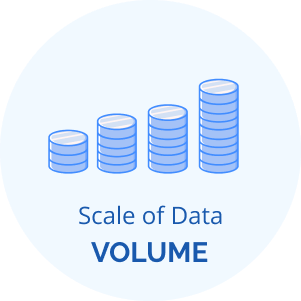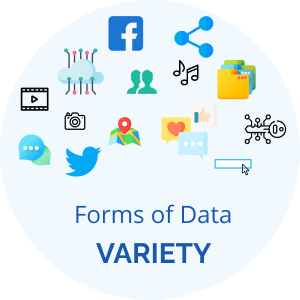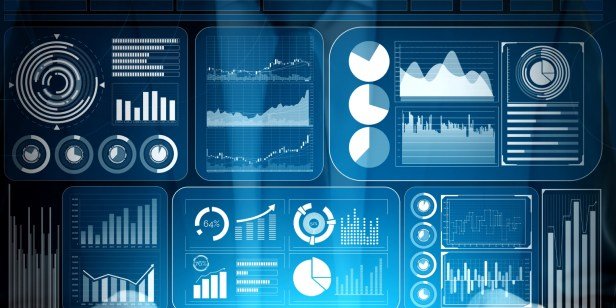- What is data science?
Data science is an emerging field of information science that uses algorithms, Artificial Intelligence, Machine Learning, and other advanced digital tools to examine and extract knowledge and value from enormous sets of both structured and unstructured data, known as Big Data. Structured data is information that is either already organized or can be easily organized, such as information in spreadsheets. Unstructured data is such information as photos, video, and audio that must be organized before it can be analyzed.
Data science has a wide variety of applications and is used in many fields, from business to medicine to education. For example, NASA uses data science techniques and algorithms to automatically compare stellar photos over time, which helps it discover comets and exoplanets.
- Why is data science important for business?
Businesses, even relatively small ones, generate massive amounts of data through their normal daily processes, including customer demographic data, customer interactions, sales information, logistical and shipping information, product information, and internal employee and communication information.
This data can be recorded and organized, and companies can then mine it for insights not only into their customers but also into the efficiency of their business model and other aspects of the way they function. But analyzing this data and putting it to good use requires expertise to avoid the risk of delving into a large trove of data and drawing incorrect and therefore unhelpful conclusions.
- How does data science add business value?
Data science takes an asset you already have—data—and draws insights and information from it that can be used to create optimal and more dynamic business strategies. It can help paint a more accurate picture of both who your customers are and what they want from you. Data science is able to recognize and highlight patterns in data and to separate the information that is important and valuable to your business from the information that can be ignored or cast aside. The technological edge data science provides can give any business an advantage over its competition in a world of increasing reliance on information.
- Is my business ready for data science?
Whether your company is ready for data science depends on several factors. Many businesses have collected more information than they realize, so engaging an outside consultant to review their position could be useful for almost any business with plans for the future. If nothing else, having an expert provide a clearer understanding of how and why a business could benefit from data science can facilitate any subsequent strategy decisions that a business must make.
For a business to be ready to use data science, it must first be aware of the commitment involved in doing so. In many cases, if not most, a data science strategy should be folded into a company’s overall digital transformation because the power and effectiveness of many advanced tech options for business, such as Big Data, Cloud Computing, and the like, are enhanced when used in cooperation with each other. To extract the greatest value and result from data science, a business should apply it in tandem with these other options.
- How do I get my business ready for data science?
Any business interested in data science should have an expert examine its current situation in terms of data intake and assets, network and IT infrastructure, current trainable staff (or the potential creation of new positions) that could handle data science issues moving forward, and other such considerations.
For some businesses, “getting ready” for data science might not be necessary, or at least not in the traditional context of business expansion. Other options are available. For example, hiring an outside firm with extensive expertise in data science and other advanced tech might be easier and more efficient for companies that wish to hit the ground running with respect to putting their data to good use. An objective, outside viewpoint might be better suited for implementation than trying to build a new section of your IT department from scratch. Even if you have employees on staff who could possibly meet the requirements, they may not have the capability or experience to exceed expectations and deliver a leap up the value curve.
- What is the difference between data science and Big Data?
Data science and Big Data can overlap substantially, but understanding what distinguishes one from the other is important. The general term Big Data refers to the current explosion of data we are experiencing in the digital age, including the gathering and exploitation of large data sets and the ways that data is recorded and stored.
Data science is a more specific, academic term that refers to the various techniques used to examine and analyze massive data sets. Data science encompasses issues of statistics and statistical modeling and the way data is organized and categorized. It often focuses on finding patterns, values, and insights in massive data sets.
To simplify, data science concerns the science of information, whereas Big Data is about the application of data science to information in the real world.
- Do I need data scientists for my business?
Your business could most likely benefit from input from data scientists, but this does not mean that you need to hire them directly. Some companies (especially tech-focused businesses and those that have undergone a complete digital transformation) have in-house data analysts and departments focused on data science and Big Data. But hiring an outside expert or consultancy might be more practical and efficient (meaning less expensive).
A consultancy’s data scientists can assist a business according to its unique needs, such as a specific project, through periodic consultations, or on a continuous basis. An outside data specialist can often provide a clearer, more objective view of a company’s data assets and thereby illuminate blind spots the company might have been unaware of.
- How can data science affect a business’s growth?
By applying data science, a business is better able to understand the needs of its customers and its employees. It can identify patterns in customer preferences that it’s never seen before and improve shipping and logistics from top to bottom. As a result, data science allows companies to seize new opportunities for growth and improve their bottom line through straightforward improvements to efficiency.
Because the volume of data in Big Data is so immensely large, no single human being, or even a team of human beings, can sift through it in a reasonable amount of time. Data science is the key to gaining insights and benefits from all the information a company possesses but is unable to analyze and apply on its own.
- Is big data necessary for data science?
Businesses need to be very careful when using the terms “Data Science” and “Big Data.” They are more than just buzzwords companies use to sound up-to-date. Data Science refers to a set of computational and mathematical techniques, and Big Data is the raw material that Data Science uses. And, like all processes, Data Science carries with it both risks and rewards. It can guide your business to greater efficiency and effectiveness in almost every area. It can help you streamline practices, from advertising to inventory. But it can also overwhelm and blind you, trapping you in a “data only” mind-set, which could misguide and halt critical thinking with respect to your business. If you want to use Big Data to help your company grow and succeed, you need a skilled, experienced partner to guide you.

Businesses need to be very careful when using the terms “Data Science” and “Big Data.” They are more than just buzzwords companies use to sound up-to-date. Data Science refers to a set of computational and mathematical techniques, and Big Data is the raw material that Data Science uses. And, like all processes, Data Science carries with it both risks and rewards. It can guide your business to greater efficiency and effectiveness in almost every area. It can help you streamline practices, from advertising to inventory. But it can also overwhelm and blind you, trapping you in a “data only” mind-set, which could misguide and halt critical thinking with respect to your business. If you want to use Big Data to help your company grow and succeed, you need a skilled, experienced partner to guide you.
Data Science has been around for a long time, but its implementation in business is relatively recent, with the advancement of and greater accessibility to more sophisticated computation technology. Big Data is the product of advanced developments in the storage of information, either in physical devices or facilitated by internet and cloud services. Both Data Science and Big Data are continuing to dynamically change and evolve as companies integrate them into their business models and learn of their advantages and drawbacks. Many businesses already have massive amounts of information about their customers that is either just sitting idle on a server or in an old database somewhere, waiting to be analyzed and put to use. And just as many companies aren’t sure what to do with that collected data. Even more aren’t aware of how it can be used to help their executive teams guide their business into the future. Simply put, having Big Data doesn’t mean you’re using Big Data.

So, what exactly is Big Data, and what is its relationship to Data Science?

Strictly speaking, Big Data refers to data sets that are too large or complex in terms of the characteristics that need to be analyzed to produce an appropriate answer to a given question. Data analysis involves the computational and mathematical techniques that make use of available knowledge and technology to process the data and extricate otherwise hidden information, patterns, and insights that can then be used to automate processes and make better-informed decisions.
Big Data has applications across the entire spectrum of business, from customer recommendations to sales strategies, transportation, and logistics efficiency, and healthcare outcomes. It can have a dramatic impact on your bottom line, but only if you incorporate it correctly into your business’s operations. Implementing any new technology and practice must be done properly to keep the process from being more trouble than it’s worth. Working with experts such as Blue Ocean Global Technology who are smart, agile, and able to quickly devise and enact the best Big Data strategy for you and your company can make all the difference.
Know What You Are Dealing With
Big Data has evolved into new forms and volumes of information derived from typical business activities and processes. In a way, it is simply an extension of the analyses that most companies have always done on aspects of their operations, such as inventories and customer demographics. But with Big Data, the amount, application, and creation of data grow exponentially.
In the world of Big Data, everything is recorded and analyzed, resulting in massive volumes of information. Sifting and analyzing this information using the most advanced mathematical and computational tools available provides companies with valuable insights and guidance.
Before the digital revolution and the emergence of Big Data, customers would enter a brick-and-mortar store, buy something (sometimes with cash), and then leave. The company would update its inventory and maybe make note of some overall purchasing trends. But today, because of networking, the internet, smartphones, and other such technological advancements, things are much different.


A store might ping a customer’s location through their phone, creating data points of how busy a store is at any given time. This data set might be combined with publicly available data such as the weather and time of day to determine how these factors affect foot traffic. Trends in inventory can be not only precisely measured and updated but also accurately projected into the future, so stores can know which items to stock. If customers use a store’s Wi-Fi, the data produced can be recorded and analyzed. Point-of-purchase information, including payment types, email addresses, and speed of purchase, are all recorded. And these are examples of in-store information just for brick-and-mortar businesses.
Online, information related to a customer’s every interaction with a business’s website is stored for aggregate analysis. Artificial intelligence (AI) is used to answer customers’ inquiries via automated conversations that are then fed back into the AI to improve its ability to serve customers. Geographic information is noted and collated, creating a precise map of just where a company’s visitors are located and which browsers and search engines they use to find it.
All of these touchpoints and interactions can lead to the creation of large amounts of data. And here is where we run into some of the big risks that come from Big Data.
The Signal and the Noise
The science and analytics of Big Data can vary widely from company to company and from practice to practice, and its effectiveness depends on how it is implemented and used. Simply having terabytes of data from your customers doesn’t mean any of it will be useful to you.
Big Data generally has three parameters, and understanding what each one means for your business is important. The first is volume. Because the amount of information is more than any one person, or even a group of people, could possibly analyze or understand on their own, the process must be automated to some extent. This is simply unavoidable, and you will likely need an expert or a team of experts if you intend to elicit actionable insights from your massive trove of data.


The second major parameter is variety. Because data is coming in from so many different places (more than you likely imagine), many Data Science techniques have been developed to extract even more data from the data you already have. Underlying patterns invisible to standard human analysis can offer a new layer of depth and complexity. A well-designed database structure and skilled interpretation make the difference between successful implementation and catastrophic misunderstanding between computer processes, stored data, and humans. Having reliable expertise at your disposal is necessary to make all the data work together and make sense.
And the third parameter is velocity. Keeping up with Big Data can be difficult. Depending on the size of your company and the number of collection touchpoints, you can easily become completely inundated with data. So much information is constantly being generated that to avoid falling behind their efforts to analyze the data, businesses must make a continuous effort to quickly process and analyze it.

You need to start by understanding just how much data your company has at its disposal and how much it is generating. Then you need an idea of how useful this data can be for your business. And you need to be confident that the effort you put into processing your Big Data will be worthwhile. After all, you don’t want to expend money and resources on such an endeavor only to find out that it won’t actually boost your bottom line. If you want Data Science to find your niche audience, amplify the relevance of your product service offering, identify gaps in your operations and talent management process, or make more informed decisions grounded in quantifiable evidence, you need the proven expertise and support of consultants such as those at Blue Ocean Global Technology, who know what steps to take and with whom to speak.
Blue Ocean Global Technology can help you in using Big Data the right way.
Data Science: Sifting Through the Ocean of Information
For complex situations, AI can be the key to organizing, sorting, and making sense of your business’s data, putting you on the path to finding the diamond in the rough in all that information. Efficiency is the key, and the smart implementation of automation can save you enormous amounts of time and effort. AI actually improves as more data is fed into it, provided that data is the right kind. Expertise is necessary to distinguish the useless information from the truly helpful one. Unstructured data pre-processing and selection can render a process that is driven by AI completely ineffective, such as when a customer service chatbot that has been provided with too much or misleading data responds to inquiries with incorrect information or misleading links.


Human oversight is required to figure out whether analysis and processing are working properly. A knowledgeable and experienced team can help you implement AI in a way that not only makes good use of your assets but also saves you time and effort. Blue Ocean Global Technology can help you get up and running on AI quickly, introducing useful technology to your business, streamlining your practices, and improving your bottom line. You want to avoid the bad habit of trying new technology only on specific projects and later having to reintroduce that same technology when the same problem or project invariably crops up again. A company-wide data practice is critical to reap the full benefits of Big Data.
The Right Way and The Wrong Way
When creating a Big Data strategy for your business, you must first decide just how aggressive you wish to be in gathering and exploiting the data. Some of the information available to you, such as customer location and demographics, could be considered private, or at least of a more personal nature. Protecting such data is important, as is using it in an ethical manner and clearly communicating to your customers and site visitors how their data will be used. Many businesses have already adopted these practices. You might have noticed that many websites ask first-time visitors to accept their browser cookie policy before engaging with any content.


Indeed, for PR and brand identity reasons, you should ensure that your customers fully understand that you will not sell any of their data to outside parties and will use data that they voluntarily provide only to improve their customer experience through customized search results and suggestions. Some companies approach Big Data like a vacuum, trying to gather every bit of data possible. But given that many customer choices today are driven by ethical concerns, your company’s data policies should instead be carefully crafted to safeguard people’s data and privacy—as well as your business’s reputation.
Data Points to Remember
01
Keep in mind these few final, but very important points about Data Science, Big Data, and AI. Having all the data in the world about your customers won’t be of any value to your business if the people charged with making tough choices for your company don’t actually understand any of it. Showing someone page after page of an Excel spreadsheet won’t help them make an intelligent decision about a business’s future. That the team handling your company’s Big Data can effectively provide insight and communicate its meaning to your executive team is imperative, and this requires presenting data findings in a visual package that is clear, concise, and actionable.


02
Additionally, we need to recognize and admit that Data Science and Big Data have their limitations. No amount of data in the world will provide a perfect answer to your business questions or reveal exactly what to do to guarantee success. Big Data can paint a clearer picture of your customers, the business environment, and your company’s inefficiencies, but it cannot achieve such outcomes without real commitment from leadership, and companies with such goals need to keep that in mind.
03
In the end, even the best AI, the most efficient automation, the Biggest Data is nonetheless created by people and, as a result, is prone to error and in need of oversight just like anything else. The human element must not be forgotten or ignored. A strictly data-driven business model might sound innovative, almost foolproof, but it can still fail. Making the most of Big Data is all about leveraging the right resources to improve efficiency, engagement, and decision making to have a positive impact on a business’s bottom line.





